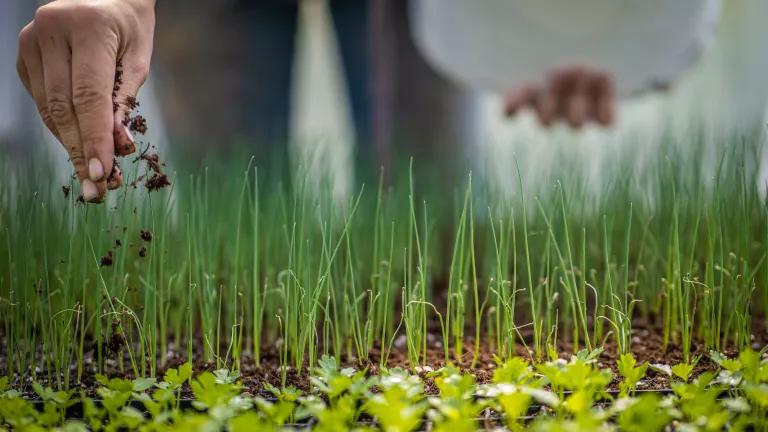City and Community Leaders Chat Food and Climate at SXSW
Recognizing that community-driven solutions are necessary to equitably mitigate and adapt to climate change and address food waste, NRDC hosted our "City Food Waste: A Burgeoning Climate Solution" panel.

Madeline Keating (moderator), Marvin Hayes, Brittany McPeak and Caroline Howe at SXSW.
South by Southwest (SXSW) in Austin, TX is a conference and series of festivals that celebrate the convergence of tech, film, music, education, and culture. The 2022 event was held March 11-20 and featured a climate change track in the conference portion, which opened space for more cross-cutting discussions. Recognizing that community-driven and local solutions are necessary to equitably mitigate and adapt to climate change and address food waste, NRDC hosted a panel in the climate change track titled City Food Waste: A Burgeoning Climate Solution. The panel featured Brittany McPeak from the City of Orlando, Caroline Howe from Washington DC, and Marvin Hayes from the Baltimore Compost Collective. The goal of the panel was to discuss how reducing food waste locally is a solution for decreasing climate-harming emissions as well as addressing current environmental injustices.
To kick off the discussion, we showed a video that discusses the fight to shut down the Bresco incinerator in Baltimore and how composting and reducing food waste can help reduce dependence on incinerators. Marvin kicked off the panel with a powerful spoken word poem about the importance of composting in the midst of the environmental injustice of the polluting incinerators. He emphasized the importance of engaging youth to take action on environmental racism in his community of South Baltimore, and describing that the goal of the Baltimore Compost Collective is to “starve the incinerator and feed the soil.”
The panelists then shared more about their work and the partnerships that make it happen. “We have ambitious climate and waste targets as a city, in order to get there, it is so clear that we are going to need to separate food waste. There is no way to get to those waste targets until food waste is separated,” said Caroline. To move close to DC’s climate and waste targets, the city is focusing on support to businesses to reduce their food waste. Caroline discussed the recent Food Waste Innovation Grants launched through the DC Department of Small and Local Business Development (DSLBD) and the impact that city support for businesses to reduce their food waste can have on raising awareness and driving down food-service related food waste generation.
Brittany highlighted the impact that Orlando’s food waste prevention messaging has had across Florida, and more recently, nationally with the expansion of Food Waste Prevention Week. In the City of Orlando, the key message is that when people waste food, they also waste money. “We try to speak to our residents and also our huge hospitality sector about the economic impacts of food waste and let them know that every single piece of food they throw away is money that is wasted,” says Brittany. Overall, the discussion focused on developing solutions that have cross-cutting, system-level impacts, focus on social and environmental justice, and are developed through strategic and innovative community and regional partnerships.
You can read a summary of the panel in the Austin Chronicle.
It was great to see SXSW prioritize conversations tackling pressing societal issues, like climate change. Expanding the range of voices at conferences, especially tech ones, is key to raising awareness and connecting the dots across complex yet inter-related approaches to societies' biggest challenges. If we laser focus on solutions in silos without considering where the problem stems from, we will not effectively address the root causes of the problems that we are collectively seeking to solve. Broad platforms like SXSW offer unique opportunities to merge complex topics like climate action, health, tech, and culture so that we can contextualize and align on the problems we are facing to create cross-sector solutions together.




